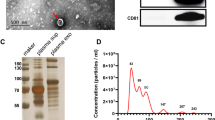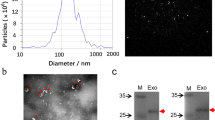Abstract
Purpose
Elastin is a signature protein of lungs. Increased elastin turnover driven by altered proteolytic activity is an important part of lung tumorigenesis. Elastin-derived fragments have been shown to be pro-tumorigenic, however, little is known regarding the biomarker potential of such elastin fragments. Here, we present an elastin turnover profile by non-invasively quantifying five specific elastin degradation fragments generated by different proteases.
Methods
Elastin fragments were assessed in serum from patients with stage I–IV non-small cell lung cancer (NSCLC) (n = 40) and healthy controls (n = 30) using competitive ELISAs targeting different protease-generated fragments of elastin: ELM12 (generated by matrix metalloproteinase MMP-9 and -12), ELM7 (MMP-7), EL-NE (neutrophil elastase), EL-CG (cathepsin G) and ELP-3 (proteinase 3).
Results
ELM12, ELM7, EL-NE and EL-CG were all significantly elevated in NSCLC patients (n = 40) when compared to healthy controls (n = 30) (ELM12, p = 0.0191; ELM7, p < 0.0001; EL-NE, p < 0.0001; EL-CG, p < 0.0001). ELP-3 showed no significant difference between patients and controls (p = 0.8735). All fragments correlated positively (Spearman, r: 0.69–0.81) when compared pairwise, except ELM12 (Spearman, r: 0.042–0.097). In general, all fragments were detectable across all stages of the disease.
Conclusions
Elastin fragments generated by different proteases are elevated in lung cancer patients compared to healthy controls but differ in their presence. This demonstrates non-invasive biomarker potential of elastin fragments in serum from lung cancer patients and suggests that different pathological mechanisms may be responsible for the elastin turnover, warranting further validation in clinical trials.





Similar content being viewed by others
References
Atkinson JJ, Lutey BA, Suzuki Y et al (2011) The role of matrix metalloproteinase-9 in cigarette smoke-induced emphysema. Am J Respir Crit Care Med 183:876–884. https://doi.org/10.1164/rccm.201005-0718OC
Balkwill FR, Capasso M, Hagemann T (2012) The tumor microenvironment at a glance. J Cell Sci 125:5591–5596. https://doi.org/10.1242/jcs.116392
Baud S, Duca L, Bochicchio B et al (2013) Elastin peptides in aging and pathological conditions. Biomol Concepts 4:65–76. https://doi.org/10.1515/bmc-2011-0062
Bihlet AR, Karsdal MA, Sand JMB et al (2017) Biomarkers of extracellular matrix turnover are associated with emphysema and eosinophilic-bronchitis in COPD. Respir Res 18:22. https://doi.org/10.1186/s12931-017-0509-x
Blood CH, Sasse J, Brodt P, Zetter BR (1988) Identification of a tumor cell receptor for VGVAPG, an elastin-derived chemotactic peptide. J Cell Biol 107:1987–1993. https://doi.org/10.1083/jcb.107.5.1987
Brown GT, Murray GI (2015) Current mechanistic insights into the roles of matrix metalloproteinases in tumour invasion and metastasis. J Pathol 237:273–281. https://doi.org/10.1002/path.4586
Devy J, Duca L, Cantarelli B et al (2010) Elastin-derived peptides enhance melanoma growth in vivo by upregulating the activation of Mcol-A (MMP-1) collagenase. Br J Cancer 103:1562–1570. https://doi.org/10.1038/sj.bjc.6605926
El Rayes T, Catena R, Lee S et al (2015) Lung inflammation promotes metastasis through neutrophil protease-mediated degradation of Tsp-1. Proc Natl Acad Sci USA 112:16000–16005. https://doi.org/10.1073/pnas.1507294112
Ella E, Harel Y, Abraham M et al (2018) Matrix metalloproteinase 12 promotes tumor propagation in the lung. J Thorac Cardiovasc Surg 155:2164–2175.e1. https://doi.org/10.1016/j.jtcvs.2017.11.110
Gminski J, Mykala-Ciesla J, Machalski M, Drozdz M (1993) Elastin metabolism parameters in sera of patients with lung cancer. Neoplasma 40:41–44
Gong L, Wu D, Zou J et al (2016) Prognostic impact of serum and tissue MMP-9 in non-small cell lung cancer: a systematic review and meta-analysis. Oncotarget 7:18458–18468. https://doi.org/10.18632/oncotarget.7607
Guarino C, Legowska M, Epinette C et al (2014) New selective peptidyl di(chlorophenyl) phosphonate esters for visualizing and blocking neutrophil proteinase 3 in human diseases. J Biol Chem 289:31777–31791. https://doi.org/10.1074/jbc.M114.591339
Gudmann NS, Manon-Jensen T, Sand JMB et al (2018) Lung tissue destruction by proteinase 3 and cathepsin G mediated elastin degradation is elevated in chronic obstructive pulmonary disease. Biochem Biophys Res Commun. https://doi.org/10.1016/j.bbrc.2018.07.038
Guyot N, Wartelle J, Malleret L et al (2014) Unopposed cathepsin G, neutrophil elastase, and proteinase 3 cause severe lung damage and emphysema. Am J Pathol 184:2197–2210. https://doi.org/10.1016/j.ajpath.2014.04.015
Halaoui R, McCaffrey L (2015) Rewiring cell polarity signaling in cancer. Oncogene 34:939–950. https://doi.org/10.1038/onc.2014.59
Han J-C, Li X-D, Du J et al (2015) Elevated matrix metalloproteinase-7 expression promotes metastasis in human lung carcinoma. World J Surg Oncol 13:5. https://doi.org/10.1186/1477-7819-13-5
Hautamaki RD, Kobayashi DK, Senior RM, Shapiro SD (1997) Requirement for macrophage elastase for cigarette smoke-induced emphysema in mice. Science 277:2002–2004
Heinz A, Jung MC, Duca L et al (2010) Degradation of tropoelastin by matrix metalloproteinases—cleavage site specificities and release of matrikines. FEBS J 277:1939–1956. https://doi.org/10.1111/j.1742-4658.2010.07616.x
Heinz A, Taddese S, Sippl W et al (2011) Insights into the degradation of human elastin by matrilysin-1. Biochimie 93:187–194. https://doi.org/10.1016/j.biochi.2010.09.011
Heinz A, Jung MC, Jahreis G et al (2012) The action of neutrophil serine proteases on elastin and its precursor. Biochimie 94:192–202. https://doi.org/10.1016/j.biochi.2011.10.006
Hinek A, Jung S, Rutka JT (1999) Cell surface aggregation of elastin receptor molecules caused by suramin amplified signals leading to proliferation of human glioma cells. Acta Neuropathol 97:399–407
Hofmann H-S, Hansen G, Richter G et al (2005) Matrix metalloproteinase-12 expression correlates with local recurrence and metastatic disease in non-small cell lung cancer patients. Clin Cancer Res 11:1086–1092
Houghton AM (2010) The paradox of tumor-associated neutrophils: fueling tumor growth with cytotoxic substances. Cell Cycle 9:1732–1737. https://doi.org/10.4161/cc.9.9.11297
Houghton AM (2013) Mechanistic links between COPD and lung cancer. Nat Rev Cancer 13:233–245. https://doi.org/10.1038/nrc3477
Houghton AM, Grisolano JL, Baumann ML et al (2006) Macrophage elastase (Matrix Metalloproteinase-12) suppresses growth of lung metastases. Cancer Res 66:6149–6155. https://doi.org/10.1158/0008-5472.CAN-04-0297
Jung S, Rutka JT, Hinek A (1998) Tropoelastin and elastin degradation products promote proliferation of human astrocytoma cell lines. J Neuropathol Exp Neurol 57:439–448. https://doi.org/10.1097/00005072-199805000-00007
Karsdal MA, Genovese F, Madsen EA et al (2016) Collagen and tissue turnover as a function of age: implications for fibrosis. J Heptol 64:103–109. https://doi.org/10.1016/j.jhep.2015.08.014
Kettunen E, Anttila S, Seppänen JK et al (2004) Differentially expressed genes in nonsmall cell lung cancer: expression profiling of cancer-related genes in squamous cell lung cancer. Cancer Genet Cytogenet 149:98–106. https://doi.org/10.1016/S0165-4608(03)00300-5
Korkmaz B, Moreau T, Gauthier F (2008) Neutrophil elastase, proteinase 3 and cathepsin G: physicochemical properties, activity and physiopathological functions. Biochimie 90:227–242. https://doi.org/10.1016/j.biochi.2007.10.009
Korkmaz B, Lesner A, Guarino C et al (2016) Inhibitors and antibody fragments as potential anti-inflammatory therapeutics targeting neutrophil proteinase 3 in human disease. Pharmacol Rev 68:603–630. https://doi.org/10.1124/pr.115.012104
Kristensen JH, Karsdal MA, Sand JM et al (2015a) Serological assessment of neutrophil elastase activity on elastin during lung ECM remodeling. BMC Pulm Med 15:53. https://doi.org/10.1186/s12890-015-0048-5
Kristensen JH, Larsen L, Dasgupta B et al (2015b) Levels of circulating MMP-7 degraded elastin are elevated in pulmonary disorders. Clin Biochem 48:1083–1088. https://doi.org/10.1016/j.clinbiochem.2015.07.009
Landskron G, De la Fuente M, Thuwajit P et al (2014) Chronic inflammation and cytokines in the tumor microenvironment. J Immunol Res 2014:149185. https://doi.org/10.1155/2014/149185
Leinonen T, Pirinen R, Böhm J et al (2006a) Expression of matrix metalloproteinases 7 and 9 in non-small cell lung cancer. Lung Cancer 51:313–321. https://doi.org/10.1016/j.lungcan.2005.11.002
Leinonen T, Pirinen R, Böhm J et al (2006b) Expression of matrix metalloproteinases 7 and 9 in non-small cell lung cancer. Relation to clinicopathological factors, beta-catenin and prognosis. Lung Cancer 51:313–321. https://doi.org/10.1016/j.lungcan.2005.11.002
Liang Y, Guo S, Zhou Q (2014) Prognostic value of matrix metalloproteinase-7 expression in patients with non-small cell lung cancer. Tumour Biol 35:3717–3724. https://doi.org/10.1007/s13277-013-1491-7
McGarry Houghton A, Houghton AM, McGarry Houghton A (2015) Matrix metalloproteinases in destructive lung disease. Matrix Biol 44–46:167–174. https://doi.org/10.1016/j.matbio.2015.02.002
Mithieux SM, Weiss AS (2005) Elastin. In: Advances in protein chemistry. Academic Press, Cambridge, pp 437–461
Noël A, Gutiérrez-Fernández A, Sounni NE et al (2012) New and paradoxical roles of matrix metalloproteinases in the tumor microenvironment. Front Pharmacol 3:140. https://doi.org/10.3389/fphar.2012.00140
Peters HL, Tripathi SC, Kerros C et al (2017) Serine proteases enhance immunogenic antigen presentation on lung cancer cells. Cancer Immunol Res 5:319–329. https://doi.org/10.1158/2326-6066.CIR-16-0141
Qu P, Du H, Wang X, Yan C (2009) Matrix metalloproteinase 12 overexpression in lung epithelial cells plays a key role in emphysema to lung bronchioalveolar adenocarcinoma transition. Cancer Res 69:7252–7261. https://doi.org/10.1158/0008-5472.CAN-09-0577
Ra H-J, Parks WC (2007) Control of matrix metalloproteinase catalytic activity. Matrix Biol 26:587–596. https://doi.org/10.1016/j.matbio.2007.07.001
Ricard-Blum S, Vallet SD (2016) Matricryptins network with matricellular receptors at the surface of endothelial and tumor cells. Front Pharmacol 7:11. https://doi.org/10.3389/fphar.2016.00011
Safranek J, Pesta M, Holubec L et al (2009) Expression of MMP-7, MMP-9, TIMP-1 and TIMP-2 mRNA in lung tissue of patients with non-small cell lung cancer (NSCLC) and benign pulmonary disease. Anticancer Res 29:2513–2517
Sand JMB, Knox AJ, Lange P et al (2015) Accelerated extracellular matrix turnover during exacerbations of COPD. Respir Res 16:69. https://doi.org/10.1186/s12931-015-0225-3
Scandolera A, Odoul L, Salesse S et al (2016) The elastin receptor complex: a unique matricellular receptor with high anti-tumoral potential. Front Pharmacol 7:1–10. https://doi.org/10.3389/fphar.2016.00032
Shah SA, Spinale FG, Ikonomidis JS et al (2010) Differential matrix metalloproteinase levels in adenocarcinoma and squamous cell carcinoma of the lung. J Thorac Cardiovasc Surg 139:984–990. https://doi.org/10.1016/j.jtcvs.2009.12.016
Siegel RL, Miller KD, Jemal A (2018) Cancer statistics, 2018. CA Cancer J Clin 68:7–30. https://doi.org/10.3322/caac.21442
Skjøt-Arkil H, Clausen RE, Rasmussen LM et al (2013) Acute myocardial infarction and pulmonary diseases result in two different degradation profiles of elastin as quantified by two novel ELISAs. PLoS One. https://doi.org/10.1371/journal.pone.0060936
Starcher B, Sauter E, Ho C (2013) Elastin turnover in malignant solid tumors. Connect Tissue Res 54:313–318. https://doi.org/10.3109/03008207.2013.820723
Stenvold H, Donnem T, Andersen S et al (2012) Overexpression of matrix metalloproteinase-7 and -9 in NSCLC tumor and stromal cells: correlation with a favorable clinical outcome. Lung Cancer 75:235–241. https://doi.org/10.1016/j.lungcan.2011.06.010
Sun Y, Li D, Lv X-H et al (2015) Roles of osteopontin and matrix metalloproteinase-7 in occurrence, progression, and prognosis of nonsmall cell lung cancer. J Res Med Sci 20:1138–1146. https://doi.org/10.4103/1735-1995.172980
Taddese S, Weiss AS, Neubert RHH, Schmelzer CEH (2008) Mapping of macrophage elastase cleavage sites in insoluble human skin elastin. Matrix Biol 27:420–428. https://doi.org/10.1016/j.matbio.2008.02.001
Toupance S, Brassart B, Rabenoelina F et al (2012) Elastin-derived peptides increase invasive capacities of lung cancer cells by post-transcriptional regulation of MMP-2 and uPA. Clin Exp Metastasis 29:511–522. https://doi.org/10.1007/s10585-012-9467-3
Wise SG, Weiss AS (2009) Tropoelastin. Int J Biochem Cell Biol 41:494–497. https://doi.org/10.1016/j.biocel.2008.03.017
Woenckhaus M, Klein-Hitpass L, Grepmeier U et al (2006) Smoking and cancer-related gene expression in bronchial epithelium and non-small-cell lung cancers. J Pathol 210:192–204. https://doi.org/10.1002/path.2039
Yang JJ, Preston GA, Pendergraft WF et al (2001) Internalization of proteinase 3 is concomitant with endothelial cell apoptosis and internalization of myeloperoxidase with generation of intracellular oxidants. Am J Pathol 158:581–592. https://doi.org/10.1016/S0002-9440(10)64000-X
Zamay T, Zamay G, Kolovskaya O et al (2017) Current and prospective protein biomarkers of lung cancer. Cancers (Basel) 9:155. https://doi.org/10.3390/cancers9110155
Acknowledgements
We acknowledge the Danish Research Foundation for supporting this study.
Author information
Authors and Affiliations
Corresponding author
Ethics declarations
Conflict of interest
All authors are employed at Nordic Bioscience involved in biomarker discovery and assay development.
Ethical approval
All procedures performed in studies involving human participants were in accordance with the ethical standards of the institutional and/or national research committee and with the 1964 Helsinki declaration and its later amendments or comparable ethical standards.
Informed consent
Informed consent was obtained from all individual participants included in the study.
Rights and permissions
About this article
Cite this article
Thorlacius-Ussing, J., Kehlet, S.N., Rønnow, S.R. et al. Non-invasive profiling of protease-specific elastin turnover in lung cancer: biomarker potential. J Cancer Res Clin Oncol 145, 383–392 (2019). https://doi.org/10.1007/s00432-018-2799-x
Received:
Accepted:
Published:
Issue Date:
DOI: https://doi.org/10.1007/s00432-018-2799-x




